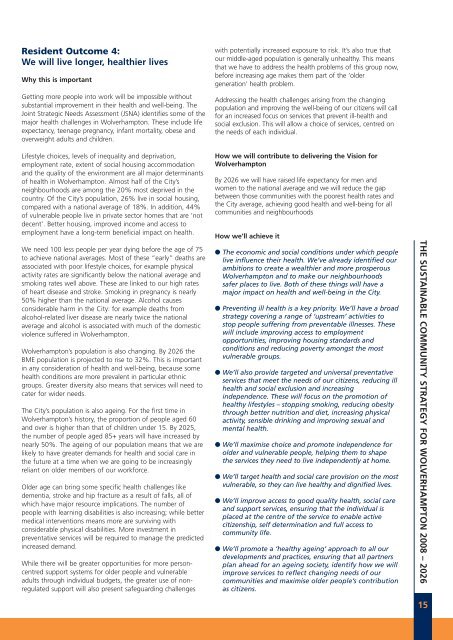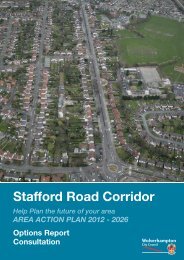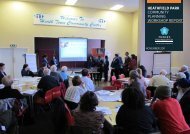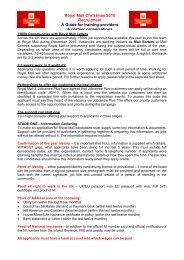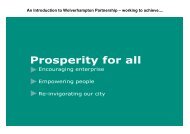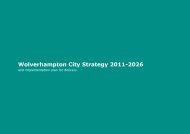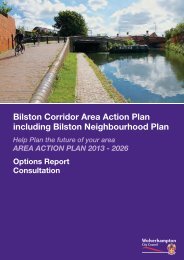Wolverhampton Sustainable Community Strategy
Wolverhampton Sustainable Community Strategy
Wolverhampton Sustainable Community Strategy
You also want an ePaper? Increase the reach of your titles
YUMPU automatically turns print PDFs into web optimized ePapers that Google loves.
Resident Outcome 4:<br />
We will live longer, healthier lives<br />
Why this is important<br />
Getting more people into work will be impossible without<br />
substantial improvement in their health and well-being. The<br />
Joint Strategic Needs Assessment (JSNA) identifies some of the<br />
major health challenges in <strong>Wolverhampton</strong>. These include life<br />
expectancy, teenage pregnancy, infant mortality, obese and<br />
overweight adults and children.<br />
with potentially increased exposure to risk. It’s also true that<br />
our middle-aged population is generally unhealthy. This means<br />
that we have to address the health problems of this group now,<br />
before increasing age makes them part of the ‘older<br />
generation’ health problem.<br />
Addressing the health challenges arising from the changing<br />
population and improving the well-being of our citizens will call<br />
for an increased focus on services that prevent ill-health and<br />
social exclusion. This will allow a choice of services, centred on<br />
the needs of each individual.<br />
Lifestyle choices, levels of inequality and deprivation,<br />
employment rate, extent of social housing accommodation<br />
and the quality of the environment are all major determinants<br />
of health in <strong>Wolverhampton</strong>. Almost half of the City’s<br />
neighbourhoods are among the 20% most deprived in the<br />
country. Of the City’s population, 26% live in social housing,<br />
compared with a national average of 18%. In addition, 44%<br />
of vulnerable people live in private sector homes that are ‘not<br />
decent’. Better housing, improved income and access to<br />
employment have a long-term beneficial impact on health.<br />
We need 100 less people per year dying before the age of 75<br />
to achieve national averages. Most of these “early” deaths are<br />
associated with poor lifestyle choices, for example physical<br />
activity rates are significantly below the national average and<br />
smoking rates well above. These are linked to our high rates<br />
of heart disease and stroke. Smoking in pregnancy is nearly<br />
50% higher than the national average. Alcohol causes<br />
considerable harm in the City: for example deaths from<br />
alcohol-related liver disease are nearly twice the national<br />
average and alcohol is associated with much of the domestic<br />
violence suffered in <strong>Wolverhampton</strong>.<br />
<strong>Wolverhampton</strong>’s population is also changing. By 2026 the<br />
BME population is projected to rise to 32%. This is important<br />
in any consideration of health and well-being, because some<br />
health conditions are more prevalent in particular ethnic<br />
groups. Greater diversity also means that services will need to<br />
cater for wider needs.<br />
The City’s population is also ageing. For the first time in<br />
<strong>Wolverhampton</strong>’s history, the proportion of people aged 60<br />
and over is higher than that of children under 15. By 2025,<br />
the number of people aged 85+ years will have increased by<br />
nearly 50%. The ageing of our population means that we are<br />
likely to have greater demands for health and social care in<br />
the future at a time when we are going to be increasingly<br />
reliant on older members of our workforce.<br />
Older age can bring some specific health challenges like<br />
dementia, stroke and hip fracture as a result of falls, all of<br />
which have major resource implications. The number of<br />
people with learning disabilities is also increasing; while better<br />
medical interventions means more are surviving with<br />
considerable physical disabilities. More investment in<br />
preventative services will be required to manage the predicted<br />
increased demand.<br />
While there will be greater opportunities for more personcentred<br />
support systems for older people and vulnerable<br />
adults through individual budgets, the greater use of nonregulated<br />
support will also present safeguarding challenges<br />
How we will contribute to delivering the Vision for<br />
<strong>Wolverhampton</strong><br />
By 2026 we will have raised life expectancy for men and<br />
women to the national average and we will reduce the gap<br />
between those communities with the poorest health rates and<br />
the City average, achieving good health and well-being for all<br />
communities and neighbourhoods<br />
How we’ll achieve it<br />
● The economic and social conditions under which people<br />
live influence their health. We’ve already identified our<br />
ambitions to create a wealthier and more prosperous<br />
<strong>Wolverhampton</strong> and to make our neighbourhoods<br />
safer places to live. Both of these things will have a<br />
major impact on health and well-being in the City.<br />
● Preventing ill health is a key priority. We’ll have a broad<br />
strategy covering a range of ‘upstream’ activities to<br />
stop people suffering from preventable illnesses. These<br />
will include improving access to employment<br />
opportunities, improving housing standards and<br />
conditions and reducing poverty amongst the most<br />
vulnerable groups.<br />
● We’ll also provide targeted and universal preventative<br />
services that meet the needs of our citizens, reducing ill<br />
health and social exclusion and increasing<br />
independence. These will focus on the promotion of<br />
healthy lifestyles – stopping smoking, reducing obesity<br />
through better nutrition and diet, increasing physical<br />
activity, sensible drinking and improving sexual and<br />
mental health.<br />
● We’ll maximise choice and promote independence for<br />
older and vulnerable people, helping them to shape<br />
the services they need to live independently at home.<br />
● We’ll target health and social care provision on the most<br />
vulnerable, so they can live healthy and dignified lives.<br />
● We’ll improve access to good quality health, social care<br />
and support services, ensuring that the individual is<br />
placed at the centre of the service to enable active<br />
citizenship, self determination and full access to<br />
community life.<br />
● We’ll promote a ‘healthy ageing’ approach to all our<br />
developments and practices, ensuring that all partners<br />
plan ahead for an ageing society, identify how we will<br />
improve services to reflect changing needs of our<br />
communities and maximise older people’s contribution<br />
as citizens.<br />
THE SUSTAINABLE COMMUNITY STRATEGY FOR WOLVERHAMPTON 2008 – 2026<br />
15


